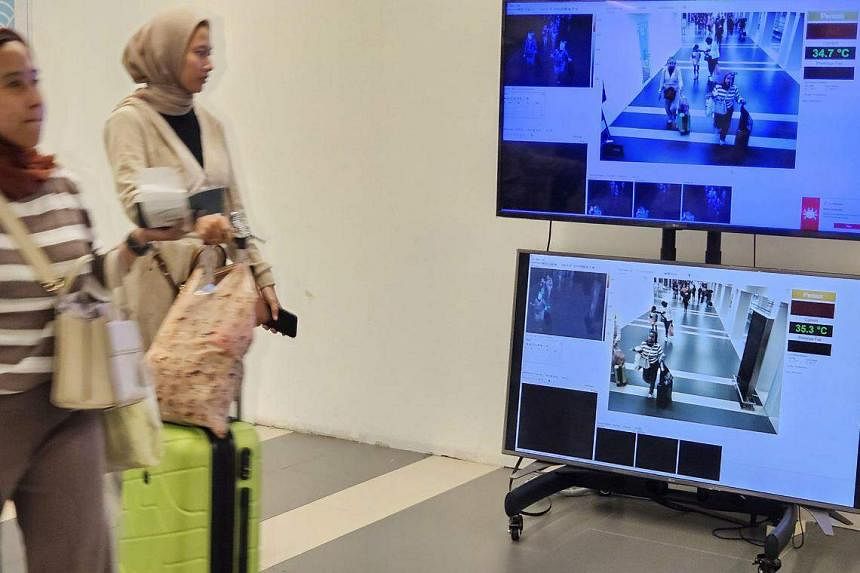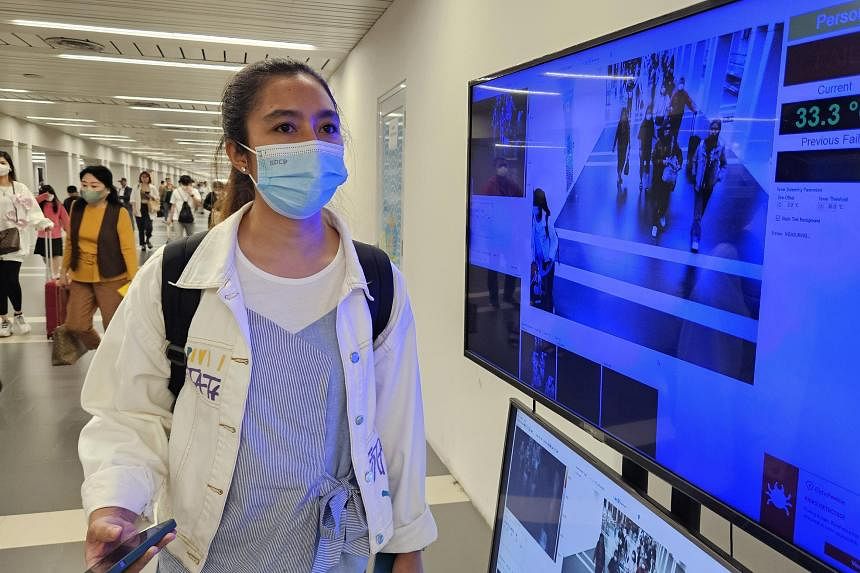JAKARTA – Indonesia has begun to install thermal body scanners at several international entry points, including Jakarta’s main international airport and Batam’s ferry terminal, to screen arriving travellers for Covid-19 amid the surge of infections in the region.
The precautionary measure was taken after the country’s Health Ministry issued a circular on Dec 8 calling for vigilance following a rise in cases in a number of South-east Asian countries, including Indonesia, Singapore, Malaysia and the Philippines.
In a statement issued on Dec 11, the Health Ministry reiterated the message and urged Indonesians to “postpone travelling to areas which are reporting a spike in Covid-19 cases”, complete their two-dose vaccination, wear masks and wash their hands, and stay home should they fall sick.
Health Ministry spokeswoman Siti Nadia Tarmizi said in the statement that Indonesians travelling overseas are at risk of getting infected due to their interactions with people from other countries.
“It is necessary to ensure that everyone has sufficient immunity to travel so that they do not become infected and become a source of infection during the trip and when returning to their homeland,” she added.
At Jakarta’s Soekarno-Hatta International Airport’s Terminal 2 on the night of Dec 11, The Straits Times saw two thermal body scanners installed near the immigration checkpoint to remotely capture the temperatures of arriving passengers, both foreigners and locals. No other health checks were made.
Ms Naning Nugrahini, who heads the airport’s port health office, told local media on Dec 9 that those who are found to be ill or display symptoms will undergo further examination, including an antigen swab test.
The port health office will also deploy health officers at the airport terminals, set up health posts to tend to passengers showing symptoms of the disease, and coordinate with a team of doctors to carry out contact tracing, she said.
“We are intensifying surveillance of domestic and foreign travellers,” she was quoted as saying by Antara news agency.
Over on the holiday island of Batam, a 40-minute ferry ride away from Singapore, thermal body scanners are also expected to be installed at the island’s five international ports from this week, Batam’s port health official in charge of quarantine and epidemiological surveillance, Dr Romer Simanungkalit, said on Dec 11.
His office is also trying to get approval from the central government to reintroduce an electronic health alert card showing passengers’ travel history and health records for screening and monitoring purposes.
It is not known if precautionary measures will be implemented at all international border entry points across the country.
Mr Muhammad Bisri, head of the health service in Riau Islands province, which Batam is a part of, said he has received no instruction from the Health Ministry on how to deal with the spike in Covid-19 cases in neighbouring countries, including Singapore.
“The situation in Singapore hasn’t had any impact on us yet,” he added.
In a statement on Dec 8, Singapore’s Ministry of Health (MOH) said Covid-19 infections have been on the rise in the country over the past two weeks, but noted that “there is no indication that the variants circulating locally are more transmissible or cause more severe disease”.
In the week of Nov 26 to Dec 2, the estimated number of local Covid-19 infections rose to 32,035 cases, compared with 22,094 cases in the previous week. The average daily hospitalisations rose to 225 from 136 in the week before, MOH said.
The increase could be due to many factors, said MOH, including the year-end travel and festive season, and waning population immunity.
In Indonesia, the Jakarta Health Office on Dec 11 confirmed that two elderly women with underlying medical conditions died from Covid-19 in December. The office also recorded 80 positive cases between Nov 27 and Dec 3, according to the Tempo news website.
The situation, however, is a far cry from the peak of the pandemic in July 2021, when 50,000 confirmed cases and hundreds of deaths were recorded in Indonesia each day.
The latest data by the World Health Organisation showed that between March 2020 and Dec 6, 2023, Indonesia recorded more than 6.81 million confirmed cases, including 161,918 deaths. More than 448 million vaccine doses had been administered as at Nov 22, 2023.
Despite soaring cases, Indonesian tourists to Singapore told The Straits Times that Covid-19 is not deterring them from travelling.
Ms Perdana Handayani, 33, a project administrator, said she spent her weekend sightseeing in Orchard Road and Little India with her friends without worry.
“Covid-19 has become endemic and as common as the flu, so there’s no need to worry too much. Anyway, I have had four vaccine doses and I stay healthy by taking vitamin C supplements every day and exercising, so of course I will continue travelling,” she said.

Another Indonesian traveller, administrative officer Susi, 42, whose name, like many Indonesian names, has only one word, said she had booked her flight in advance and did not want to cancel her trip.
She said: “It’s the government’s job to take care of the people’s health, so I can understand why they ask us to take precautions. To be honest, I was a little worried about the rising cases in Singapore because I have never been infected.
“But there’s no way to avoid the crowds in Singapore, so I just wore a mask everywhere.”


